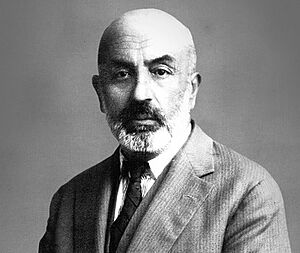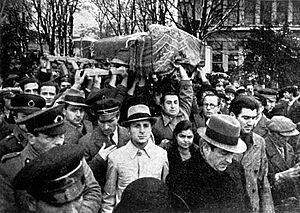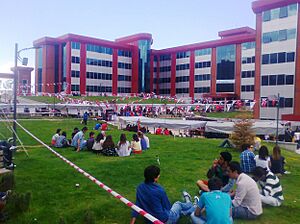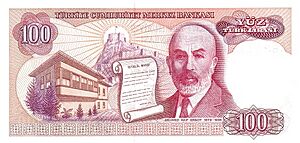Mehmet Akif Ersoy facts for kids
Quick facts for kids
Mehmet Akif Ersoy
|
|
|---|---|

Ersoy in the 1930s
|
|
| Born | Mehmed Ragîf 20 December 1873 Constantinople, Ottoman Empire |
| Died | 27 December 1936 (aged 63) Istanbul, Turkey |
| Occupation | Poet, author and politician |
| Nationality | Ottoman, later Turkish |
| Literary movement | The republican era |
| Notable works | Safahat, İstiklâl Marşı |
| Signature | |
 |
|
Mehmet Akif Ersoy (born December 20, 1873 – died December 27, 1936) was a famous Turkish poet and writer. He was also a teacher and a politician. He is best known for writing the words to the Turkish National Anthem.
Many people think Ersoy was one of the greatest writers of his time. He was very good at using the Turkish language. He was also known for his strong love for his country. He played an important part in the Turkish War of Independence.
In Turkey, you can often see a framed copy of the national anthem by Ersoy. It is usually on the wall above the blackboard in classrooms. Next to it, there is often a Turkish flag. You might also see a picture of Atatürk, who founded Turkey.
Contents
Mehmet Akif Ersoy's Life Story

Mehmet Akif Ersoy was born in Constantinople (now Istanbul) in 1873. His birth name was Mehmed Ragîf. His father, İpekli Tahir Efendi, was from Albania. His mother, Emine Şerife Hanım, had Turkish and Uzbek roots.
His father was a teacher at a religious school. Mehmet Akif grew up in the Fatih area of Istanbul. He learned Arabic and memorized the Quran with his father's help.
When he was about to finish school, his father passed away. A fire also destroyed his home. These events made Ersoy stop his studies. He had to start working to support his family. He wanted to get a job quickly. So, he went to a veterinary school and finished in 1893.
In the same year, Mehmet Akif Ersoy started working for the government. He researched animal diseases in different parts of Anatolia. During his travels, he also gave speeches in mosques. He wanted to teach people and help them learn more.
He was a strong supporter of his country during the time of the Ottoman Empire's decline. He helped a lot in the fight to create the Turkish Republic. He encouraged people to be patriotic through his speeches. He gave many of these speeches in mosques across Anatolia.
On November 19, 1920, he gave a famous speech in Kastamonu. In this speech, he spoke against the Treaty of Sèvres. This treaty was unfair to Turkey. He asked people to use their faith and weapons to fight against foreign powers. This speech was printed and shared widely. It even became a small book for Turkish soldiers.
Mehmet Akif Ersoy is most famous for writing the words to the Turkish National Anthem. The Turkish Grand National Assembly chose his poem on March 12, 1921. It became the official lyrics for the national anthem.
In 1925, Ersoy moved to Cairo, Egypt. He taught the Turkish language at a university there for 11 years. He got sick during a trip to Lebanon. He returned to Turkey and passed away in Istanbul in 1936.
He was buried in the Edirnekapı Martyr's Cemetery in Istanbul. He was the first person in the history of the Turkish Republic to have the national anthem played at his funeral.
Mehmet Akif Ersoy's Impact
Mehmet Akif Ersoy is a very important person in the history of modern Turkey. He left a lasting mark on the country. During the time of the Turkish Republic, he taught history and literature at different universities.
Ersoy had agreed to translate the Quran into Turkish. This was for the government's religious affairs department. However, he never delivered his translation. He was worried that the new government might try to separate Islam from the Arabic language. This was after they had changed the call to prayer to be in Turkish instead of Arabic.
A university in Burdur, Turkey, is named after him. His picture was also on the back of the Turkish 100 lira banknotes from 1983 to 1989.
Mehmet Akif Ersoy's Writings
Mehmet Akif Ersoy knew a lot about traditional Eastern literature. He also studied the works of famous Western writers. These included Victor Hugo and Alphonse de Lamartine.
He is best known for his book from 1911 called Safahat. This book is a collection of 44 poems of different lengths. The earliest poem in this book is from 1904.
He is also famous for writing the words to the Turkish National Anthem, İstiklâl Marşı. This means The March of Independence in English. It was chosen as the anthem in 1921. Many Turks call him their "National Poet" because of this.
See also
- Mehmet Akif Literature Museum Library, Ankara
 | Lonnie Johnson |
 | Granville Woods |
 | Lewis Howard Latimer |
 | James West |




